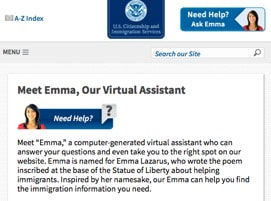Abstract:
Recent examples of virtual assistant technologies designed as Latina information service workers are noteworthy objects of study for their potential to bridge analyses of Latinas’ labor history and information technology. Latinas in the United States have traditionally worked in blue-collar information technology sectors characterized by repetitive labor and low wages, such as electronics manufacturing and customer service. Latina information service workers, though fundamental to technoscience, have been largely invisible in histories of computing. Latina virtual assistants mark a shift in this labor history by relying on the strategic visibility of Latina identity in/as the technology interface. Our research explores Latina virtual assistants designed by Airus Media and installed as airport workers in airports along the southwestern border of the United States. We situate the technocultural narratives present in the design and marketing of these technologies within the broader histories of invisible Latina information labor in the United States. We find continuities between the ways Latinas have historically been positioned as “ideal” information workers and the use of Latina identity in the design of virtual assistants. We argue that the strategic visibility of Latina virtual assistants is linked to the oppressive structures of invisibility that have traditionally organized Latina information service workers. Cite as: Sweeney, M. E., & Villa-Nicholas, M. (2022). Digitizing the “Ideal” Latina Information Worker. American Quarterly, 74(1), 145–167. https://doi.org/10.1353/aq.2022.0007. (Pre-print available at http://ir.ua.edu/handle/123456789/7549.)
Abstract: Cite as: Melissa Villa-Nicholas & Miriam E. Sweeney (2019) Designing the “good citizen” through Latina identity in USCIS’s virtual assistant “Emma”, Feminist Media Studies, DOI: 10.1080/14680777.2019.1644657
I had a wonderful time presenting with my research partner Melissa Villa-Nicholas on one of our projects about Latina AI at the Harvard Kennedy School on March 25th. Our talk focused on "Emma", the Latina virtual assistant used by the United States Citizenship and Immigration Services (USCIS) as a part of their e-government services. This presentation explores the cultural affordances of Latina identity as a strategic design choice in the Emma interface that extends citizenship and nation-building projects for the state, while masking underlying information and data gathering capabilities.
We were privileged to have Dana Chisnell, co-director of the Center for Civic Design, serve as a moderator for our talk. We felt very welcome, thanks largely to all of the hard work and planning of Vanessa Rhinesmith, the Associate Director of digitalHKS. Thank you to everyone who came and talked with us about the politics and surveillance implications of digital technologies designed to gather information about Latinx communities. Recording of talk available to watch here. *Watch for our paper, "Designing the ‘good citizen’ through Latina identity in USCIS’s virtual assistant ‘Emma'", in Feminist Media Studies forthcoming later in 2019. |
Archives
March 2024
Categories
All
|



 RSS Feed
RSS Feed
